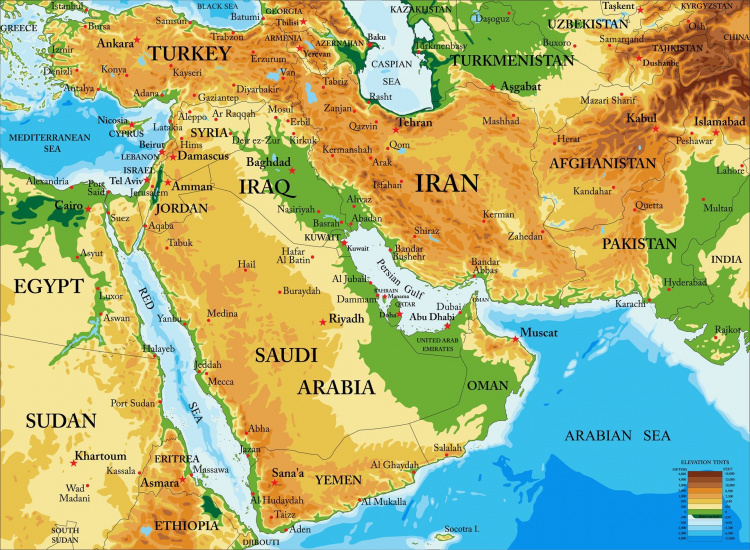Iran's Discourse on "Strong Region" Revisited

Iran's advocacy for a "strong region" has been a cognitive part of its foreign policy behavior, particularly in the Persian Gulf region considered as a primary arena of Iran's regional environment. Articulated by Iran's foreign policy officials including the Foreign Minister Mohammad Javad Zarif, this concept has been a guiding principle of Iran's external behavior in its (multi) region, which encompasses the Caspian region as well. In terms of Iran's "regional identity," the notion that the purpose of Iran's regional behavior is not to simply advance Iran's national interests and has a broader objective of creating a "strong region" has definite (geo) strategic implications.
In essence, by advancing the idea of a "strong region," Iran behaves like a regional 'patriot,' giving the regionalist dimension a priority. In turn, this implicates Iran in a cooperative security frame of reference that pins its hope on inward-looking rather than outward-looking security orientation, requiring a concert of nations on a regional scale. Also, this idea promotes the regional economic cooperation and intra-state trade, which is a sine quo anon for a viable, vibrant, and stable "strong region," hobbled nowadays in Iran's multi-region as a result of regional tensions. Thus, overcoming the existing tensions is an important prerequisite for achieving a "strong region" simply because instability and tension are poisonous for regional interdependence and inter-region trade. Therefore, it is incumbent on policy-makers to fully identify the sources of regional weaknesses and instabilities as a prelude for an organic quest for a "strong region."
Political rivalries, conflicting national interests, uneven development and unequal distribution of power, foreign powers' meddling, and lack of proper planning are the chief problems hampering the development of a "strong region." To these one may also add religious fault lines and the Persian Gulf's bifurcation along the Sunni-Shiite fault line, which explains why Sunni commentators have (mis) interpreted Iran's call for a "strong region" as a façade for Iranian hegemony. Fear of Iran has led to the counter-argument, heard even in Iraq, that pursuing "strong nations" ought to be prioritized over "strong region," which is suspected as a theoretical camouflage for Iranian "primacy" or hegemony. But here we must distinguish between perceptions and misperceptions, and also point at the flawed dichotomy of "strong region" and "strong nations." Such a dichotomy is untenable since it presents these as stark alternatives when, in fact, the latter is inherent in the former and, indeed, constitutes one of its theoretical presuppositions since, in a word, we cannot have a "strong region" without having strong states creating it. The two concepts are complementary and not contradictory, to put it simply, but only to a limit.
To elaborate, a "strong region" in Persian Gulf cannot be based on a regional 'unipolar' moment revolving around a hegemonic power seeking regional primacy. That would make an epiphenomenon of other states and turn them into vassals of the regional hegemon. A region can be strong economically but not so much so militarily, and vice-versa. We cannot a priori make assumptions about the congruency of the economic and military-security dimensions. Nor should we succumb to the idealistic goal of an equilibrium of power in the region, in light of the existing disparities in terms of the indexes of power. A realistic assessment of the regional states' relative and comparative power is necessary in order to grasp the challenges confronting the advocates of a "strong region. This should also include an assessment of states' intentions, ambitions, and short and long-term projections, knowing full well that in the absence of a cooperative environment the net result of uneven development may turn out to be the retarded development of some states and the (coercive) bandwagoning of the weak states with the stronger states.
Looking at the hybrid security architecture of today's Persian Gulf, it is relatively easy to jump to the conclusion that the present trend is rather contradictory, featuring an uneasy co-existence of unilateralist, bilateralist, and multi-lateralist orientations operating simultaneously, often trumping each other. Altogether, the noble objective of "collective security" has remained hostage to this contradictory milieu for decades, with little prospect of reaching its fulfillment any time soon. At the moment, the required stability of intra-state relations in Persian Gulf region is simply missing, thus making it difficult if not impossible to realize this objective. This war and terrorist-ravaged region is also scene to a contestation of power between US and Iran, which has dictated on Iran a more vigorous push for regional cooperation, an antidote to US sanctions. There is, in other words, a delicate connection between the US's confrontational Iran policy on the one hand and, on the other, Iran's counter-strategy of survival through regionalism.
Should Iran succeed in surviving the onslaught of US sanctions, then both the pro-US regional states as well as US itself may reconsider the viability of the present Iranophobic approach, which has gained primacy as a dominant yet albeit problematic paradigm. Optimistically speaking, thanks to Iran's confidence-building efforts with its neighbors, vividly demonstrated in the recent Iraq visit of Iran's President Hassan Rouhani, the walls of mistrust between Iran and its neighbors in Persian Gulf region will soon be replaced with the positive spirit of good neighborly relations and regional cooperation, born by the intrinsically non-zero sum nature of their respective interests, as well as their shared needs, such as combatting the sources of instability in the region for the sake of a prosperous region benefiting all the region's populations and their political systems. The premise of a "strong region" is strong leadership in promoting and fostering regional cooperation without any hint of hegemony, which must be pursued by Iran and other regional powers in tandem with each other.

